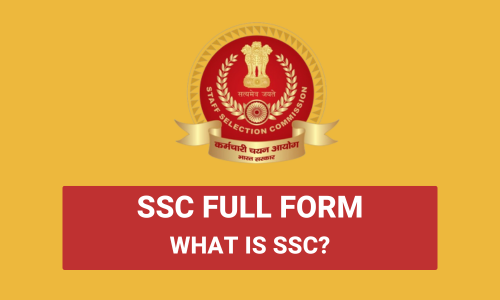
Table of Contents
SSC Full Form
The full form of SSC is the Staff Selection Commission.
The Staff Selection Commission (SSC) is an important organization under the Government of India that conducts various examinations to recruit staff for various posts in the ministries and departments of the government of India and subordinate offices and agencies.
The Staff Selection Commission is one of the major bodies of the Department of Personnel and Training (DoPT) which consists of a chairman, two members, and a secretary-cum-controller of examinations.
History of the SSC
During 1967–68, the parliament recommended setting up a Service Selection Commission to conduct examinations to recruit lower categories of posts. Later, on November 4, 1975, the Department of Personnel and Administrative Reforms established this commission under the name of the Subordinate Service Commission. On September 26, 1977, the Subordinate Service Commission was renamed the Staff Selection Commission. On May 21, 1999, the government of India redefined the functions of the Staff Selection Commission through the Ministry of Personnel and Public Grievances. All the examinations conducted under the SSC run through the new constitution and functions implemented on June 1, 1999.
Headquarters and Regional Offices
The Staff Selection Commission has its headquarters at the CGO Complex in New Delhi. SSC has seven regional offices all over India; they are situated in Prayagraj, Mumbai, Kolkata, Guwahati, Chennai, Bangalore, and New Delhi. It also has two sub-regional offices in Raipur and Chandigarh. The regional office and sub-regional office are headed by a regional director and a deputy director, respectively.
Exams Conducted by SSC
SSC conducts various examinations throughout the year for different levels of posts. Some of the major examinations are:
1. SSC Combined Graduate Level Examination (CGL):
• Eligibility: Bachelor’s degree from a recognized university.
2. SSC Combined Higher Secondary Level Examination (CHSL):
• Eligibility: 12th standard pass or equivalent from a recognized board.
3. SSC Junior Engineer (JE) Examination:
• Eligibility: Degree or diploma in engineering.
4. SSC Multi-Tasking Staff (MTS):
• Eligibility: 10th standard pass or equivalent from a recognized board.
5. SSC Stenographer Grade ‘C’ and ‘D’ Examination:
• Eligibility: 12th standard pass and skill test in stenography.
6. SSC Junior Hindi Translator (JHT) Examination:
• Eligibility: Master’s degree in Hindi with English as a compulsory or elective subject.
7. SSC Constable (GD)
• Eligibility: 10th standard pass or equivalent from a recognized board.
8. SSC Selection Post Examination:
• Eligibility: Varies from 10th standard to graduation depending on the post.
9. SSC Central Police Organization (CPO) Examination:
• Eligibility: Bachelor’s degree from a recognized university.
Functions and Importance of SSC
1. Recruitment: SSC plays a crucial role in recruitment for various central government positions, ensuring a systematic and fair selection.
2. Transparency: Through various measures like conducting exams in multiple stages and maintaining high standards, SSC ensures transparency and merit-based selections.
3. Employment: Provides opportunities for millions of job seekers across India, contributing significantly to employment generation in the public sector.
SSC’s role is vital in managing a large workforce for the Indian government, helping maintain efficiency and effectiveness in public service through its structured and transparent recruitment processes.
